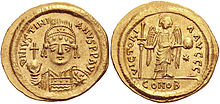Mauricius (Gepid general)

Mauricius (born before 520 – 536) was a Gepid general fighting for the Byzantine Empire. He was the son of Magister militium Mundus. He was presumably an MVM vacans.[1]
Biography
[edit]Mauricius was the son of Mundus (Mundo), himself possibly a grandson of Attila, king of the Huns.[2][3][4] He was a strategos, a military general, in the Byzantine Empire. In 529, he went to Constantinople with his father, where he received gifts from the emperor (Justinian I).[1]
In 532 he fought in the Nika riots on the side of the Byzantines. In January of that year he commanded his troops in the hippodrome massacre, which ended the riots.[1]
In 535, he and his father took part in the Gothic War. That year, he and his father sailed out to Dalmatia, where Mundus led his army against the Goths, while Belisarius invaded Italy. His father defeated the Goths, taking the capital of Salona. The next year, a Gothic army arrived, to reconquer the lost province. He ran across the Gothic army while on a scouting expedition with just a few men with him. He was trapped by the Goths and killed in the ensuing skirmish, after a fierce fight.[1] His enraged father sailed out and defeated the Goths, but, too eager in the following pursuit, he was mortally wounded.[5][6]
Legacy
[edit]His son, Theudimund was part of the barbarian military aristocracy, and fought the Ostrogoths in Treviso in 540.[7][3]
Family
[edit]Mauricius was the son of the Gepid general Mundus and an unknown woman. He had the following offspring:
References
[edit]- ^ a b c d e Martindale, J.R. (1992). The Prosopography of the Later Roman Empire 2 Part Set: Volume 3, AD 527-641. Cambridge University Press. p. 854. ISBN 978-0-521-20160-5. Retrieved 23 November 2022.
- ^ Maenchen-Helfen, Otto J. (1973). The World of the Huns: Studies in Their History and Culture. University of California Press. p. 364, 409. ISBN 9780520015968.
- ^ a b Wolfram, Herwig (2005). The Roman Empire and Its Germanic Peoples. University of California Press. p. 144. ISBN 9780520244900. Retrieved 23 November 2022.
- ^ Kim, Hyun Jin (2013). The Huns, Rome and the Birth of Europe. Cambridge University Press. ISBN 9781107067226. Retrieved 23 November 2022.
- ^ Procopius, De Bello Gothico, I.VII
- ^ Hughes, Ian (Historian) (2009). Belisarius : the last Roman general. Yardley, Pa.: Westholme. ISBN 9781594160851. OCLC 294885267.
- ^ a b Jotischky, Andrew; Stringer, Keith J (2019). The Normans and the 'Norman Edge' Peoples, Polities and Identities on the Frontiers of Medieval Europe. Taylor & Francis. ISBN 9781317022534. Retrieved 23 November 2022.
- ^ Akademie der Wissenschaften in Göttingen; Bayerische Akademie der Wissenschaften; Deutsche Akademie der Wissenschaften zu Berlin; Österreichische Akademie der Wissenschaften (1957). Forschungen und Fortschritte Volumes 31-32 (in German). VDI-Verlag. Retrieved 23 November 2022.
German: Einen germanischen Namen trug wohl auch Mauricius' Tochter, welche Aruth, ein hochgeborener, romish erzogner Heruler, zur Frau nahm / English: Mauricius' daughter, whom Aruth, a high-born, Roman-educated Herul, took to wife, probably also bore a Germanic name
